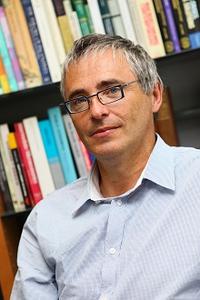Christian Gollier
Visiting Professor of Economics from Toulouse School of Economics, France
To confront our responsibilities toward future generations, a universal price of 50 €/tCO2 is desirable.
Professional biography
Christian Gollier is an internationally renowned researcher in Decision Theory under Uncertainty and its applications in climate economics, finance, and cost-benefit analysis, with a special interest in long-term (sustainable) effects. He is fellow of the Econometric Society, and won the Paul Samuelson Award for his 2001 MIT book “The Economics of Risk and Time”. With Jean Tirole, he created the Toulouse School of Economics, where he serves as director (2007-2015 and 2017- ). He is the president-elect of the European Association of Environmental and Resource Economists (EAERE). He is one of the Lead Authors of the last two reports of the IPCC on climate change.
What are your main research interests?
Are we collectively too selfish, acting insufficiently for the well-being of future generations, or are we, on the contrary, too virtuous and too long-termist? The determination to fight climate change as a global goal is part of this question. Other applications of my research may be found, for example, in socially responsible investments, the evaluation of public policies (investment in transportation, education, research, water or energy infrastructures), and the preservation of exhaustible natural resources and of biodiversity. Operationally, the myriad of associated decisions are decentralized through price signals (interest rates and risk premiums), expressing the way in which our society values investment projects, long-term saving products, long-dated assets, and more generally, any action that transfers consumption and ecological services across generations. The main objective of my research agenda is to provide operational tools towards the problem of valuing the economic, financial, social and environmental impacts of our actions in favor of the distant future.
How does your research have influence beyond the academic world? Does this include any roles you have beyond the academy?
Over the last two decades, I have been prominently involved in the debate on the long-term discounting controversy that followed the publication of some provocative papers and documents by Martin Weitzman and Nicolas Stern in relation to the measure of the social cost of carbon. I have been a lead author of the 4th and 5th reports of the Intergovernmental Panel on Climate Change published in 2007 and 2013, respectively. I have assisted governments in France, the U.K., Norway, the Netherlands, and others to revise their procedures around evaluating public investment. I advise a large number of public and private institutions around the world on evaluation of their long-term investment projects.
Is teaching still a significant part of your working life? What particular method or approach would you say characterises your teaching?
I teach to PhD candidates for approximately half of my teaching load in Toulouse. In an attempt to make introductory microeconomics more accessible to young students, I decided 3 years ago to also teach this course in the first year undergraduate programs at TSA, with no maths, and with a methodology where we first present facts associated with a policy question before exposing a possible theory. I am part of the CORE project (https://www.core-econ.org/about/) for this.
What specific passions or concerns particularly inspire you in your work?
I am very much involved in the public debate about how to organize the energy transition. I write op-eds in journals, and I participate in radio and tv debates on this matter. A book will come out in early May 2019 (prior to the European Election).
Which of your publications would you regard as the most significant and why?
My MIT book (2001) “The Economics of Risk and Time” is still the international reference in the literature on expected utility theory.
My most useful contribution to the debate on climate change and the social cost of carbon is my Princeton UP book (2013) “Pricing the Planet’s Future”.
What are you particularly hoping to achieve during your time as a Visiting Professor in Gothenburg?
Gothenburg is one of the best places in the world to work on climate economics, and I am eager to become part of that story.
Contact
Would you like to meet Christian and/or have an idea for future cooperation?
Send an email to his contact person at the School: Thomas Sterner
Or visit his home university website!

Focus areas
- Decision under uncertainty
- Climate change
- Evaluation of long-term investments and public policies
- Asset pricing
Funding
The Elof Hansson Foundation